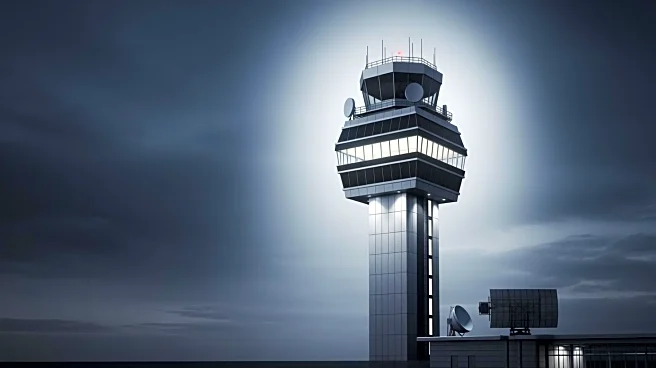What's Happening?
Transportation Secretary Sean Duffy has raised concerns about the impact of the ongoing government shutdown on the U.S. air traffic control system. The shutdown, attributed to a political standoff, has left
approximately 13,000 air traffic controllers without pay, forcing some to consider second jobs to make ends meet. Duffy highlighted the potential for significant disruptions in air travel, particularly during the holiday season, as controllers face financial pressures. He emphasized the importance of controllers focusing on their primary duties to ensure safe flight operations, despite the lack of pay. The situation has also led to frustration among controllers, who feel neglected by Congress, which they perceive as prioritizing other issues over their paychecks.
Why It's Important?
The government shutdown poses a significant threat to the U.S. aviation industry, with potential delays and cancellations affecting millions of travelers. The financial strain on air traffic controllers could compromise the safety and efficiency of air travel, as these professionals are essential for maintaining order in the skies. The situation underscores the broader implications of political gridlock, highlighting how legislative impasses can have real-world consequences on critical infrastructure and public services. The aviation sector, a vital component of the U.S. economy, could face long-term challenges if the shutdown persists, affecting not only travel plans but also the industry's workforce stability and recruitment efforts.
What's Next?
If the shutdown continues, the aviation industry may experience increased flight disruptions, particularly during peak travel periods. The pressure on air traffic controllers to manage their financial obligations while maintaining their professional responsibilities could lead to staffing shortages and operational inefficiencies. Stakeholders, including airlines and travel organizations, may lobby for a resolution to the shutdown to mitigate its impact on the industry. Additionally, there could be calls for legislative action to ensure that essential workers, like air traffic controllers, receive timely compensation during government shutdowns to prevent similar crises in the future.
Beyond the Headlines
The current situation highlights the ethical and operational challenges faced by essential workers during government shutdowns. The reliance on air traffic controllers to maintain safety without pay raises questions about worker rights and the responsibilities of government employers. The potential recruitment crisis, as young professionals reconsider careers in a system that does not guarantee financial stability, could have long-term implications for the aviation sector. This scenario also reflects broader societal issues regarding the prioritization of public services and the impact of political decisions on everyday citizens.









